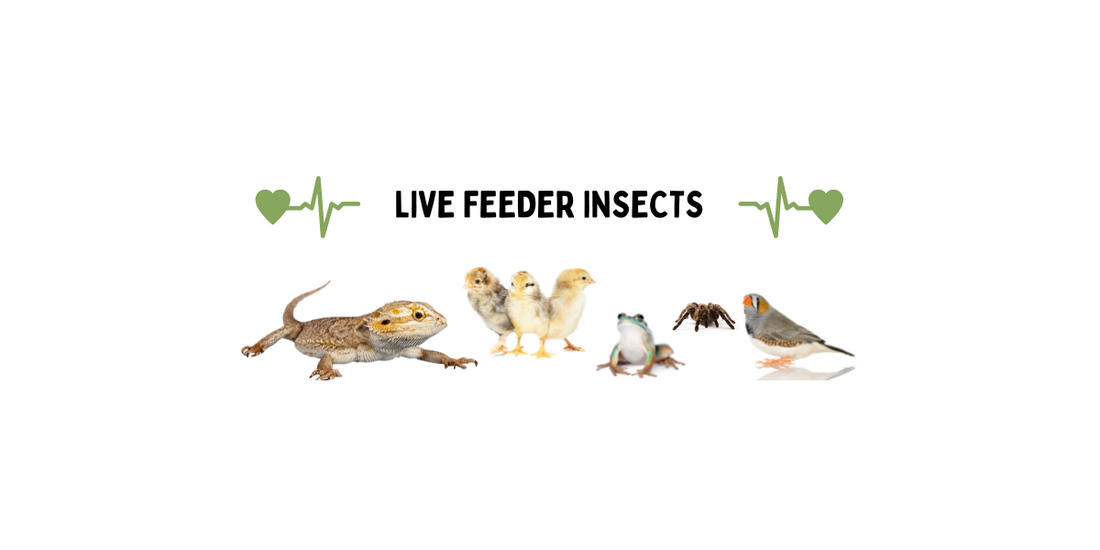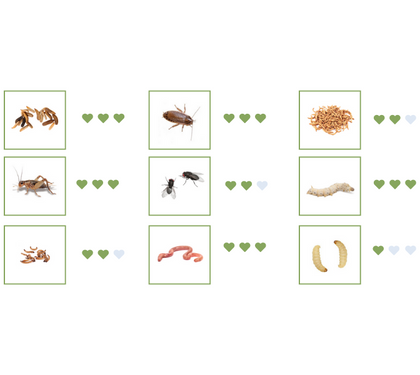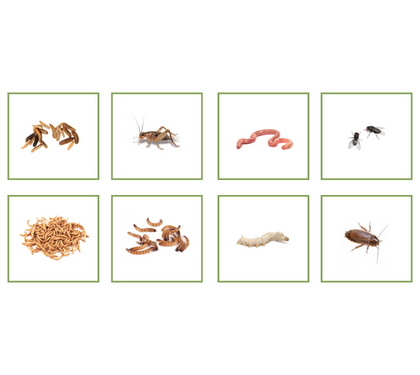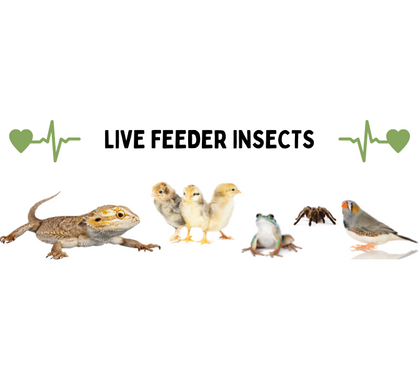Insectivores are pets that eat insects as part of their diet. Common pets include birds, chickens, frogs, lizards, turtles, scorpions and spiders.
While some owners may prefer not to offer live food to their pet, there are some great benefits to consider before looking for alternatives.
5 Benefits of Feeding Live Insects to your Pet:
- encourages eating through stimulation of movement
- engages instinctive foraging (hunting) behaviour
- mimics a natural wild-type diet
- promotes good health when included as part of a balanced diet
- offers healthy weight gain for animals that are sick, injured or breeding
ENCOURAGE FUSSY EATERS
As an alternative to live food, insects are now available canned, freeze-dried and frozen; however, there is some controversy about whether these offer the same nutritional benefits.
It may seem more convenient to reach for a can of insects, but it is still commonly accepted that food provided in its natural state provides the best source of nutrition.
Also, while some animals will accept non-moving food, others need extra stimulation. The movement from live insects often triggers a positive feeding response, enticing even the fussiest of eaters.
ENGAGE INSTINCTIVE HUNTING
Many insectivorous pets have instinctive foraging (hunting) behaviours. You can engage these instincts through the natural stimulus offered in live food diets.
There are two basic foraging techniques: sit-and-wait (ambush) and active foraging.
‘Sit-and-wait’ foraging is just that. Your pet spends long periods remaining still (almost motionless), patiently waiting for prey to come past, then ambushes them with relatively fast speed.
On the other hand, active foraging involves your pet frequently wandering throughout its environment, searching for prey.
The behavioural feeding needs of your pet are just as important as their nutritional needs; By allowing your pet to express their species-typical behaviours you are providing them with much-needed mental stimulation.
MIMIC A NATURAL DIET
In the wild, the diet of insectivorous animals consists of a wide variety of insects. Although this diversity is challenging to match in captivity, the key to good health is mimicking a wild diet as closely as possible.
Captive insectivores are generally offered as little as one or two species of cultured insects, which most commonly includes crickets, mealworms and wood roaches.
Increasing the diversity of live insects offered in captive diets ensures a more balanced and nutrient-rich profile.
Live feeder insects can include:
- black soldier fly larvae (BSFL)
- crickets
- common mealworms
- dermestids
- earthworms
- flies & fly pupae
- giant mealworms
- hornworms
- silkworms
- snails
- wax worms
- woodlice
- wood roaches (woodies)
PROMOTE GOOD HEALTH
It is essential to offer any captive animal a varied and nutritionally balanced diet to meet their biological requirements and maintain good health, generally.
A nutritionally deficit, or otherwise inappropriate, diet can lead to dehydration, disease or poor health in your pet.
It is important to note that the nutritional requirements vary between different species as well as individual animals. The type of food and quantities needed will largely depend on many factors, including age, activity level, body condition, gender, size and overall health.
You should consult a veterinarian for advice about your pet’s nutrition if you are unsure.
OFFER A NUTRITIONALLY BALANCED DIET
A balanced diet ensures you provide a good standard of health for your pet by catering to all their nutritional needs.
When diet alone cannot meet all your pet’s needs, you will need to provide dietary supplementation in the form of calcium powder, multivitamins or gutload. Supplements are critical when feeding your pet insects that do not naturally have a good calcium:phosphorous ratio.
Three main things are needed to achieve a balanced diet in captivity:
-
feed a variety of different insect types
including different life stages of each insect type e.g. larvae, pupae and adult.
-
gutload your feeder insects
feed your live insects a high-quality food a few hours before offering them to your pet for added nutritional benefit.
-
increase your feeder insects’ calcium content
add calcium to the gutload mix, dusting insects in calcium immediately before feeding to your pet or a combination of both.
ENCOURAGE HEALTHY WEIGHT GAIN
Healthy weight gain may be necessary for many reasons, most commonly when an animal is sick, injured or during the breeding season. Your pet has high physical demands placed on them in these circumstances, and they need additional nutrients to recover or otherwise maintain good health.
Both obesity and starvation adversely affect your pet’s health, so you need to monitor the amount of food consumed to prevent both overfeeding and underfeeding. A good indication of a healthy weight in your pet is body condition.
Considerations
There are alternatives to feeding your pet live insects, however, the benefits of offering your pet a live food diet far outweighs the convenience of other available food types.




